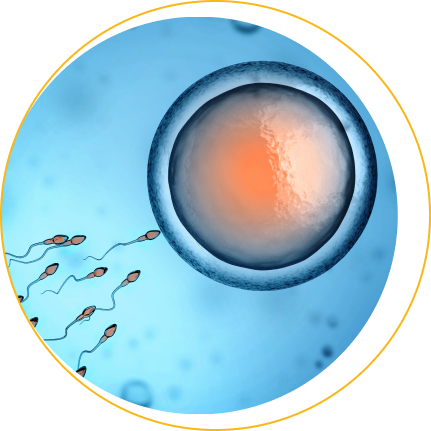

IVF with donated embryos
Since 2008, GENNET has been assisting infertile couples in achieving their dreams of a family through the use of donated cells. Thanks to our sophisticated donation program, we have a comprehensive database of donors. We consistently achieve a high success rate, which places us among the European leaders in the field of assisted reproduction. This is evidenced by the portfolio of our patients, who come to us not only from the Czech Republic but from all around the world.
Who can benefit from IVF with donated embryos?
Who can benefit from IVF with donated embryos?
IVF treatment with donated embryos is considered for couples where partners do not have sufficiently high-quality own gametes (sex cells). In this case, a suitable donor embryo is offered to the couple and is transferred into the patient's uterus.
IVF treatment using donated embryos is mainly approached in the following cases:
- If the woman has a low number of her own eggs or their quality is low.
- If the woman suffers from premature ovarian failure or has no ovaries.
- If one of the partners suffers from a serious illness, there is a risk of transmission to the child. In this case, IVF with donated eggs or sperm may also be used.
- Patients have had several unsuccessful cycles with their own eggs and sperm.
- Patients need donor sperm or eggs to conceive, but prefer donor embryos for various reasons.
- If the man has a low sperm count or poor quality sperm and the woman meets one of the conditions listed above.

What is the process of IVF treatment with donated embryos?
The basic principle of IVF treatment with donated embryos involves fertilising the donor's eggs with the donor's sperm. The resulting embryos are then frozen until the couple is ready for the embryo transfer into the recipient's uterus.
Before the embryo transfer, the patient undergoes hormonal preparation to optimise her uterus for successful implantation.
IVF treatment with donated embryos enables couples to experience the joy of pregnancy together and the unique journey of giving birth to their own child, even if they cannot conceive using their own gametes.
Legal framework for IVF treatment with donated embryos
Donation of gametes in the Czech Republic is voluntary, non-commercial (donors are compensated for the costs associated with the donation process - medicines and vitamins, transport, accommodation, lost wages) and completely anonymous (the born child has no right to know the identity of the sperm or egg donor even after the age of 18). Patients only learn basic non-identifying characteristics about the donor.
Egg donors are healthy women aged 18-34 years, sperm donors are healthy men aged 18-39 years.
At GENNET, we have very strict criteria for sex cell donors, and each donor must undergo a series of detailed medical examinations.
Medical screening and gynaecological examination of the female donors usually includes the following tests:
- Blood count,
- AMH and TSH hormone testing,
- Blood group and Rh factor,
- Tests for infectious diseases and sexually transmitted diseases (HIV, hepatitis B, C, syphilis),
- Drug and narcotic test,
- Routine gynaecological examinations including ultrasound.
Medical screening of the male donors includes:
- Spermiogram examination,
- Blood count,
- Blood type,
- Tests for infectious diseases and sexually transmitted diseases (HIV, hepatitis B, C, syphilis),
- Drug and narcotic test.
Genetic consultation with donors:
During the consultation, the geneticist will discuss with the potential donor the medical history in her/his family, the ethnicity of her/his extended family and other significant hereditary dispositions.
This genetics-focused meeting with donors is another opportunity for us to get to know the potential donor and ensure that patients have the best chance of having a healthy baby.
As part of this genetic testing, all donors undergo the following tests:
- karyotype testing: an assessment of the structure and number of chromosomes,
- genetic tests for the most common genetic diseases in the population:
- cystic fibrosis,
- spinal muscular atrophy,
- deafness,
- sex-linked genetic defects.
We select suitable egg donors and sperm donors from our extensive database based on the physical characteristics of the couple, including blood type and phenotype (eye and hair colour, height, weight, skin colour, ethnicity).

Book a free initial consultation with our IVF specialist. You can book your consultation online from the comfort of your home or we will be happy to meet you in person at our clinic, depending on your preference.
During your consultation, our experienced IVF doctor will explain the entire IVF process with donor embryo treatment. You will discuss your and your partner's medical history, especially in relation to your reproductive health.
The doctor will perform necessary examinations of the patient and based on them, propose an individual treatment plan. The goal of hormonal treatment is to ideally prepare the patient's endometrium (the lining of the uterus) for the reception and successful implantation of the embryo.
An experienced donor team selects the appropriate embryo for the patient from our extensive database based on the phenotypic characteristics of the couple (eye and hair colour, height and weight, ethnicity) and blood type.
All donors undergo detailed medical and genetic screening at GENNET.
At GENNET, we achieve a high success rate of embryo thawing. Due to the effectiveness of assisted reproductive methods, treatment success rates, and particularly efforts to minimise risks associated with multiple pregnancies, we typically transfer one embryo into the patient's uterus (in exceptional cases, two embryos).
The embryo transfer is painless and takes place without anaesthesia. During the procedure, the embryo is transferred into the patient's uterus using a thin catheter under ultrasound control. Approximately 15 minutes after the embryo transfer, the patient can leave the clinic.
To increase the chances of successful embryo implantation, post-embryo transfer patients take progesterone and/or estradiol - hormones to help maintain the pregnancy.
Verification of the treatment success should always be done with a pregnancy blood test, which is 100% reliable. The patient will have a blood test approximately 14 days after the embryo transfer. By checking the hCG level, we will determine whether the patient is pregnant. In another two to three weeks, the patient will undergo an ultrasound scan to confirm foetal cardiac action. The medication is usually taken until the 12th week of pregnancy.

Book a free initial consultation with our IVF specialist. You can book your consultation online from the comfort of your home or we will be happy to meet you in person at our clinic, depending on your preference.
During your consultation, our experienced IVF doctor will explain the entire IVF process with donor embryo treatment. You will discuss your and your partner's medical history, especially in relation to your reproductive health.
The doctor will perform necessary examinations of the patient and based on them, propose an individual treatment plan. The goal of hormonal treatment is to ideally prepare the patient's endometrium (the lining of the uterus) for the reception and successful implantation of the embryo.
An experienced donor team selects the appropriate embryo for the patient from our extensive database based on the phenotypic characteristics of the couple (eye and hair colour, height and weight, ethnicity) and blood type.
All donors undergo detailed medical and genetic screening at GENNET.
At GENNET, we achieve a high success rate of embryo thawing. Due to the effectiveness of assisted reproductive methods, treatment success rates, and particularly efforts to minimise risks associated with multiple pregnancies, we typically transfer one embryo into the patient's uterus (in exceptional cases, two embryos).
The embryo transfer is painless and takes place without anaesthesia. During the procedure, the embryo is transferred into the patient's uterus using a thin catheter under ultrasound control. Approximately 15 minutes after the embryo transfer, the patient can leave the clinic.
To increase the chances of successful embryo implantation, post-embryo transfer patients take progesterone and/or estradiol - hormones to help maintain the pregnancy.
Verification of the treatment success should always be done with a pregnancy blood test, which is 100% reliable. The patient will have a blood test approximately 14 days after the embryo transfer. By checking the hCG level, we will determine whether the patient is pregnant. In another two to three weeks, the patient will undergo an ultrasound scan to confirm foetal cardiac action. The medication is usually taken until the 12th week of pregnancy.
1. Preparatory phase
Book a free initial consultation with our IVF specialist. You can book your consultation online from the comfort of your home or we will be happy to meet you in person at our clinic, depending on your preference.
During your consultation, our experienced IVF doctor will explain the entire IVF process with donor embryo treatment. You will discuss your and your partner's medical history, especially in relation to your reproductive health.
The doctor will perform necessary examinations of the patient and based on them, propose an individual treatment plan. The goal of hormonal treatment is to ideally prepare the patient's endometrium (the lining of the uterus) for the reception and successful implantation of the embryo.
An experienced donor team selects the appropriate embryo for the patient from our extensive database based on the phenotypic characteristics of the couple (eye and hair colour, height and weight, ethnicity) and blood type.
All donors undergo detailed medical and genetic screening at GENNET.
2. Transfer of the embryo into the patient's uterus
At GENNET, we achieve a high success rate of embryo thawing. Due to the effectiveness of assisted reproductive methods, treatment success rates, and particularly efforts to minimise risks associated with multiple pregnancies, we typically transfer one embryo into the patient's uterus (in exceptional cases, two embryos).
The embryo transfer is painless and takes place without anaesthesia. During the procedure, the embryo is transferred into the patient's uterus using a thin catheter under ultrasound control. Approximately 15 minutes after the embryo transfer, the patient can leave the clinic.
3. Hormonal medication after embryo transfer
To increase the chances of successful embryo implantation, post-embryo transfer patients take progesterone and/or estradiol - hormones to help maintain the pregnancy.
4. Pregnancy test and embryo implantation success check
Verification of the treatment success should always be done with a pregnancy blood test, which is 100% reliable. The patient will have a blood test approximately 14 days after the embryo transfer. By checking the hCG level, we will determine whether the patient is pregnant. In another two to three weeks, the patient will undergo an ultrasound scan to confirm foetal cardiac action. The medication is usually taken until the 12th week of pregnancy.
Congratulations! You're pregnant!
It may only be 8 weeks from your first visit to the clinic until the pregnancy test is confirmed!
IVF treatment success rate in GENNET
Thanks to the top-notch work of our experienced embryologists, we achieve a success rate of over 85% in fertilising eggs. This increases the chances of selecting a suitable embryo for transfer. The success statistics of treatment at GENNET clinics are based on the number of clinical pregnancies of our clients.
Success rate of the IVF program according the age
- The number of all cycles at the Gennet clinics Almost 5000
-
Success rate
Donor program 69 % -
Success rate of the IVF
treatment more than 40 %
Your stories
“Our journey was long, and the decision to receive a donated embryo was not easy. But in the end, it was the best decision we ever made. We appreciate all the donors who chose to help. They gave the most precious gift - life. Thanks to them, we have become parents, and we will be forever grateful to them for our wonderful son.“

Cost of IVF treatment with donated embryos
Every couple at GENNET is cared for individually, so the final cost is determined by many factors and varies from patient to patient.
IVF CYCLE WITH DONATED EMBRYOS WITH GUARANTEE
Price includes:
- Expenses related to the donation process
- Guarantee of an embryo suitable for transfer at the blastocyst stage
- Guarantee of priority order in case of unsuccessful thawing of embryos. Payment is only charged for embryos actually transferred.
- A coordinator fluent in English/German/Italian is available to patients throughout the treatment.
- The third cycle free of charge if the client does not achieve pregnancy (confirmed by a negative heart rate) after two cycles with donated embryos at our clinic. Additionally, if two blastocysts were transferred in both the 1st and 2nd cycles of frozen donated embryos, then in the free 3rd cycle, the patient is entitled to have 2 blastocysts transferred as well.
- In all other cases, the patient is entitled to have 1 blastocyst transferred in the 3rd free cycle.
- In order to thank our clients for their trust, we have created the GENNET loyalty programme. We greatly appreciate that we are in favour of many of our clients, even in case of an unsuccessful cycle. The idea is simple: after every cycle our clients receive a voucher for a discount of 10% in the next cycle. The voucher is valid for 12 months from the date of issue, and is non-transferable. The voucher is only valid for the same type of treatment. The voucher cannot be used for KET.
Price does not include:
- Other additional laboratory methods (based on doctor's/embryologist's recommendation and clients' wishes.)
- Medication
Price includes:
- Expenses related to the donation process
- Guarantee of an embryo suitable for transfer at the blastocyst stage
- Guarantee of priority order in case of unsuccessful thawing of embryos. Payment is only charged for embryos actually transferred.
- A coordinator fluent in English/German/Italian is available to patients throughout the treatment.
- The third cycle free of charge if the client does not achieve pregnancy (confirmed by a negative heart rate) after two cycles with donated embryos at our clinic. Additionally, if two blastocysts were transferred in both the 1st and 2nd cycles of frozen donated embryos, then in the free 3rd cycle, the patient is entitled to have 2 blastocysts transferred as well.
- In all other cases, the patient is entitled to have 1 blastocyst transferred in the 3rd free cycle.
- In order to thank our clients for their trust, we have created the GENNET loyalty programme. We greatly appreciate that we are in favour of many of our clients, even in case of an unsuccessful cycle. The idea is simple: after every cycle our clients receive a voucher for a discount of 10% in the next cycle. The voucher is valid for 12 months from the date of issue, and is non-transferable. The voucher is only valid for the same type of treatment. The voucher cannot be used for KET.
Price does not include:
- Other additional laboratory methods (based on doctor's/embryologist's recommendation and clients' wishes.)
- Medication

Complete Price List of Assisted Reproduction
Fulfil your dream of a family
Why GENNET?
Take the first step
Frequently asked questions
The doctor, together with our experienced donor team, will select a suitable embryo from our extensive database of donors based on the physical characteristics of the couple - height, weight, eye and hair colour, ethnicity, skin colour, blood type.
Due to the high efficiency of assisted reproduction methods, the success rate of treatment and above all the desire to minimise the risks associated with multiple pregnancies, we usually transfer one embryo into the patient's uterus. Depending on the patient's preference and the doctor's recommendation, two embryos can be transferred in exceptional cases.
In the case of treatment using donated embryos, we cannot guarantee another embryo from the same donors in the future. But we will do our best to accommodate the treated couple.
If patients would like more embryos from identical donors. It is possible to consider treatment with donated oocytes and donor insemination, where all embryos resulting from this cycle will go to the treated couple.
Treatment with donated embryos has no significant health risks. Like any treatment, it may have some side effects or a certain level of discomfort during the treatment process. The most common side effects of hormonal stimulation include breast pain, bloated abdomen, moodiness.
IVF with donated embryos involves several stages and the possible level of discomfort or pain may vary from person to person.
- Hormonal Stimulation:
Hormonal medication used to prepare the uterine lining for embryo implantation can sometimes cause mild side effects such as bloating, mood swings, and breast tenderness. - Embryo Transfer:
Embryo transfer is a relatively quick and simple procedure that usually isn't associated with pain. Some women may experience mild discomfort during or after the transfer. - Luteal Phase Support:
Hormonal medications like progesterone are commonly used to support pregnancy during the luteal phase. Vaginal progesterone application is often recommended as it has shown the best treatment outcomes in terms of success rates.
For preventing complications, besides the individual approach of specialists to the patient, the woman's own discipline is also crucial. She should responsibly adhere to all instructions and recommendations from the doctor and staff.
Egg and sperm donation in the Czech Republic is completely anonymous, the born child has no right to know the identity of the sperm or egg donor even after the age of 18. Patients only learn basic non-identifying characteristics about the donor (eye and hair colour, height, weight, ethnicity).
Our experienced donation team selects suitable donor embryos for the treated couple from our extensive database based on the physical characteristics of the couple, including blood type and phenotype (eye and hair colour, height, weight, skin colour, ethnicity).
The total length of treatment is individual for each couple and depends on many factors. The shortest possible length of treatment is approximately two menstrual cycles for a woman. On average, it takes about 3 months from the first consultation for treatment with donated embryos to embryo transfer.
Together with your partner, you will experience an unforgettable period of pregnancy. During pregnancy, a woman can influence the nutrition of the foetus. At the end of the journey (or rather at its beginning), you will experience the unique experience of childbirth.
According to the laws of the Czech Republic, we can treat heterosexual couples with assisted reproduction methods where the woman is under the age of 49 years (48 years and 364 days).
Couples up to 40 years of age of the woman (39 years and 364 days) are eligible for reimbursement of part of the costs by the health insurance.
IVF treatment with donated embryos is one of the most effective methods of infertility treatment, achieving a high success rate.
Because each treated couple is unique, it is not possible to generalise which method of assisted reproduction is the most effective. Every couple will reach the same outcome – a baby – through a slightly different path.
According to the law of the Czech Republic, only heterosexual couples up to the age of 49 can be treated with assisted reproduction methods.
If a woman is considering delaying motherhood to a later age for any reason, we recommend considering social freezing, which allows a woman's eggs to be frozen for later use.
It is not necessary to follow any special regimen before IVF. However, it is highly recommended to follow a healthy lifestyle:
- Maintain an optimal weight
- Do not smoke, limit alcohol consumption
- Limit caffeine
- Avoid stress
- Take appropriate dietary supplements
BMI (body mass index) significantly affects the success of IVF treatment. Elevated values increase the risk of complications during IVF treatment and subsequent pregnancy and delivery. To ensure the safest and most successful treatment, we have set a BMI limit of 40 for IVF treatment with donated embryos.
Where to obtain medication in your own country will be recommended by your personal coordinator and the prescriptions are sent electronically to patients.
When having personal consultations at GENNET, medication can be purchased directly in Prague. Buying medication in the Czech Republic is cost-effective and stress-free for patients.
Most patients arrive for the second ultrasound check around the 9th day of hormonal preparation. The embryo is transferred approximately halfway through the menstrual cycle, meaning around the 15th day of the cycle. Therefore, patients spend approximately a week in Prague.
GENNET clinic is located directly in the historic centre of Prague. It is easily accessible from the airport by both public transport and taxi. Through partnerships with numerous hotels near the clinic, you can benefit from discounted rates. Your coordinator will provide you with tips for accommodation.
GENNET Praha 1
Na Poříčí 26
110 00 Praha 1




